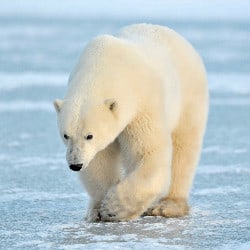Global Warming Is Leaving Polar Bears Starving

Polar bears have not been able to adapt to warmer summers in the Arctic which has meant that less food is available. Previously scientists thought that the bears would enter into a type of walking hibernation when deprived of food, however the latest research suggests that when food is scarce in hotter conditions, polar bears simply starve.
Lack of sea ice is the problem
The authors of the research says prospects for the species survival in a world which is much warmer are grim. In 2008, polar bears were listed as being a threatened species in the United States. Back then the government agency responsible for conservation highlighted the fact that the greatest threat the species faced is the dramatic decline in sea ice. Polar bears mainly feed on seals which are hunted on the sea ice. However because of the reduction in sea ice, there has been a reduction in seal numbers which means the bears are finding it hard to find food to feed on.
Walking hibernation
In the past some scientists have suggested that the polar bear would be able to survive with less food by entering into a state which they call walking hibernation which is very similar to the way many species of bear deal with the winter. Researchers embarked on a very dangerous and expensive trial to test this idea, attaching satellite collars and other tracking devices to track the movements of bears.
The study looked at over 24 bears in the in the Beaufort Sea, north of Alaska and it was concluded during the summer months, the bears did not slow down and when food was in short supply, they simply starved.
“Their metabolism is very much like a typical food limited mammal rather than a hibernating bear. If you or I were to be food-limited for weeks on end we would look like the bears’ data.” said John Whiteman from the University of Wyoming.
Polar bears have an amazing ability to swim
Whilst the bears were unable to change how they behave when it comes to food, they do display an an amazing adaptation which enables them to swim in cold water. Polar bears can allow their outermost portion of the body to cool off which keeps their inner most vital organs protected said Dr. Whiteman. The researchers gave one example of the extraordinary swimming ability of polar bears with one female surviving a nine day, 400 mile swim from shore to ice. When the bear was next captured about two months later, she had lost 22 per cent of her body weight and a cub.



